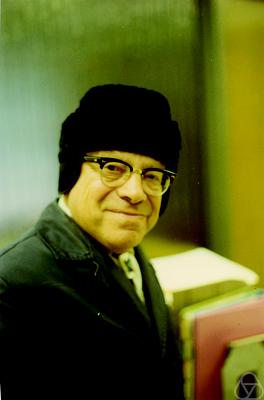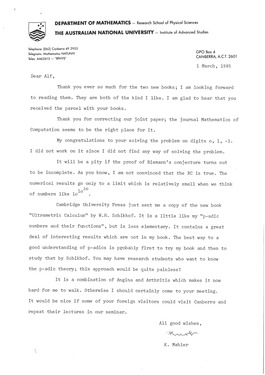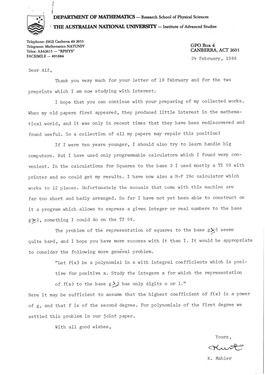Biography
 Kurt Mahler was born on 26 July 1903 at Krefeld am Rhein in Germany; he died in his 85th year on 26 February 1988 in Canberra, Australia. From 1933 onwards most of his life was spent outside of Germany, but his mathematical roots remained in the great school of mathematics that existed in Germany between the two world wars. Above all Mahler lived for mathematics; he took great pleasure in lecturing, researching and writing. It was no surprise that he remained active in research until the last days of his life. He was never a narrow specialist and had a remarkably broad and thorough knowledge of large parts of current and past mathematical research. At the same time he was oblivious to mathematical fashion, and very much followed his own path through the world of mathematics, uncovering new and simple ideas in many directions. In this way he made major contributions to transcendental number theory, diophantine approximation, p-adic analysis, and the geometry of numbers. Towards the end of his life, Kurt Mahler wrote a considerable amount about his own experiences; see 'Fifty years as a mathematician', 'How I became a mathematician', 'Warum ich eine besondere Vorliebe fur die Mathematik habe', 'Fifty years as a mathematician II'. There is also an excellent account of his life and work by Cassels (J.W.S. Cassels, 1991, 'Obituary of Kurt Mahler', Acta Arith. (3), 58, 215-228).
Kurt Mahler was born on 26 July 1903 at Krefeld am Rhein in Germany; he died in his 85th year on 26 February 1988 in Canberra, Australia. From 1933 onwards most of his life was spent outside of Germany, but his mathematical roots remained in the great school of mathematics that existed in Germany between the two world wars. Above all Mahler lived for mathematics; he took great pleasure in lecturing, researching and writing. It was no surprise that he remained active in research until the last days of his life. He was never a narrow specialist and had a remarkably broad and thorough knowledge of large parts of current and past mathematical research. At the same time he was oblivious to mathematical fashion, and very much followed his own path through the world of mathematics, uncovering new and simple ideas in many directions. In this way he made major contributions to transcendental number theory, diophantine approximation, p-adic analysis, and the geometry of numbers. Towards the end of his life, Kurt Mahler wrote a considerable amount about his own experiences; see 'Fifty years as a mathematician', 'How I became a mathematician', 'Warum ich eine besondere Vorliebe fur die Mathematik habe', 'Fifty years as a mathematician II'. There is also an excellent account of his life and work by Cassels (J.W.S. Cassels, 1991, 'Obituary of Kurt Mahler', Acta Arith. (3), 58, 215-228).
This synopsis was taken verbatim from Historical Records of Australian Science, vol.9, no.4, 1990. More information on Kurt Mahler can be found through the following links:
- Wikipedia, the free encyclopedia
- MacTutor
- Australian Academy of Science
- Acta Arithmetica -- Obituary by Cassels
- Australian National University
- Encyclopedia of Australian Science
- Mathematics Genealogy Project (Mahler's students)
- The Mahler Needham Collection at ANU
- The Mahler Lectureship
- Heide Smith's Photographs of Canberra and Portraits of Canberrans
- The Legacy of Kurt Mahler (Jon Borwein, Yann Bugeaud, Michael Coons) [EMS Newsletter March 2014]
- The Legacy of Kurt Mahler (Jon Borwein, Yann Bugeaud, Michael Coons) [Gazette Communications]


